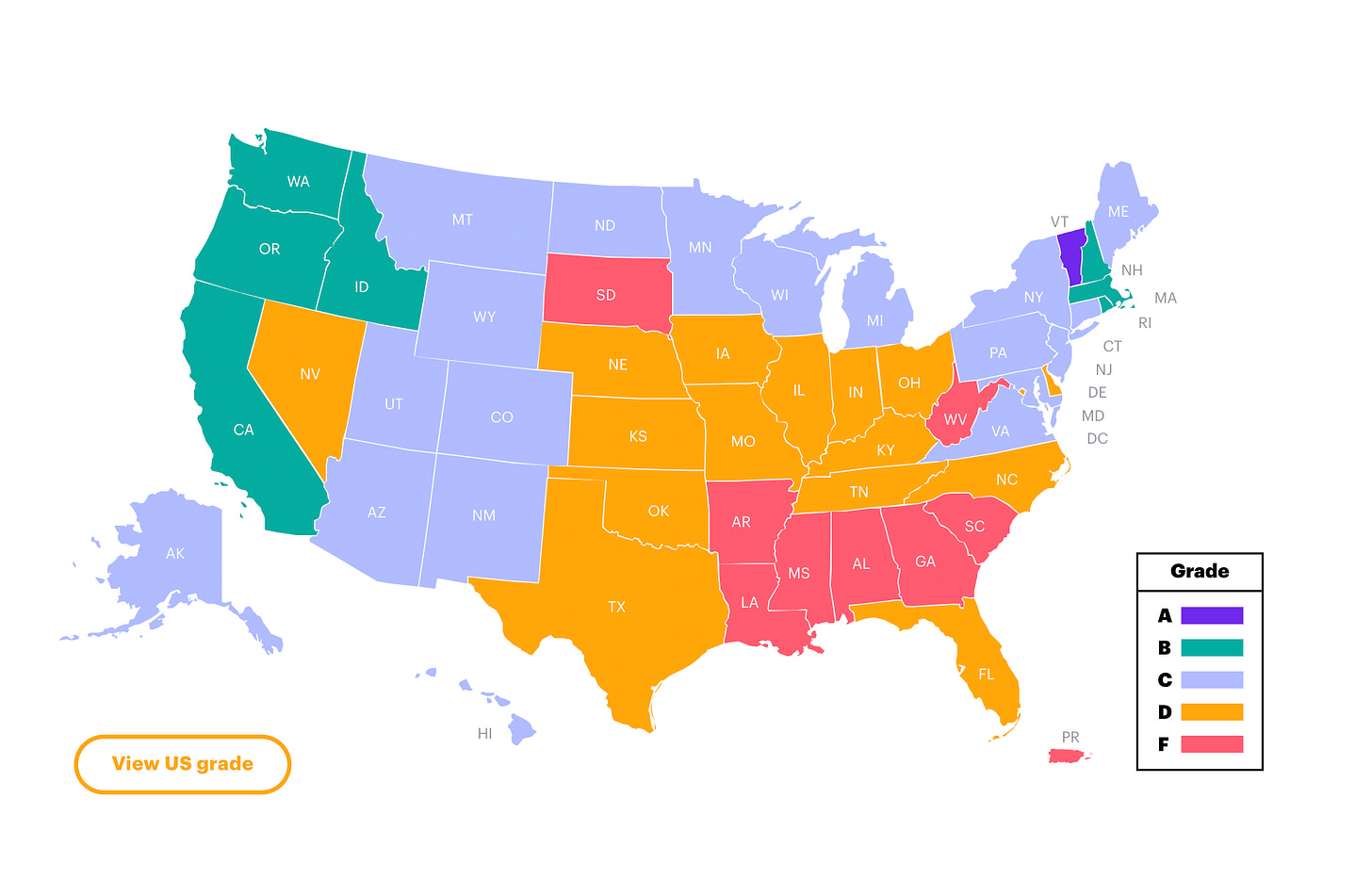US earns 'D+' for preterm birth rate in new March of Dimes report card
Remains worst grade in report history for third consecutive year.
Chronic conditions, inadequate prenatal care and racial disparities continue to fuel historic preterm birth rates in the US, particularly in the southern region.
In its annual maternal and infant health ‘report card’, the non-profit March of Dimes has revealed that the preterm birth rate remains historically high at 10.4% with significant disparities among racial and ethnic groups. This report details the US's persistent challenges in improving maternal and infant health outcomes and highlights the urgent need for the US to prioritize the health of moms and babies.
Over 370,000 babies were born preterm in 2023, according to the 2024 report card, with one-third of the largest US cities receiving an ‘F grade’ for preterm birth rates.
State by state
Twenty-four states experienced worsening rates, many in the southeastern US, with Black birthing people facing preterm birth rates 1.4 times higher than their peers.
The report reveals many risk factors for preterm birth are not improving, including inadequate prenatal care and chronic health issues. In 2023, the rate of inadequate prenatal care rose to 15.7%, the highest in a decade, with even higher rates among Black and American Indian/Alaska Native communities.
Lack of adequate prenatal care is linked to a 9% increase in the rate of preterm birth compared to those who receive adequate prenatal care, stressing the need for early intervention. Chronic conditions like hypertension and diabetes remain significant risks, with pre-pregnancy hypertension rising over 10% in just one year. This condition, a leading cause of preeclampsia, can dangerously elevate blood pressure and lead to preterm birth.
Dr. Amanda P. Williams, Interim Chief Medical Officer at March of Dimes said:
"As a clinician, I know the profound impact that comprehensive prenatal care has on pregnancy outcomes for both mom and baby.”
"Yet, too many families, especially those from our most vulnerable communities, are not receiving the support they need to ensure healthy pregnancies and births. The health of mom and baby are intricately intertwined. If we can address chronic health conditions and help ensure all moms have access to quality prenatal care, we can help every family get the best possible start."
The environmental impact
New in this year's report, March of Dimes examined environmental factors impacting maternal and infant health outcomes. Research shows pregnant people exposed to extreme heat and air pollution are more likely to give birth preterm, have underweight or stillborn babies, and suffer from preeclampsia. Nearly 40% of those pregnant are at risk of exposure to extreme heat at some point in their pregnancy, while almost three in four are at risk of exposure to poor air quality.
Cindy Rahman, March of Dimes Interim President and CEO said:
"Every baby deserves the chance for a healthy start, yet the data continue to show unacceptable health outcomes for far too many families.”
"March of Dimes is committed to advocating for policies that make healthcare more accessible like Medicaid expansion, addressing the root causes of disparities, and increasing awareness of impactful solutions like our Low Dose, Big Benefits campaign, which supports families and communities to take proactive steps toward healthy pregnancies."
Key findings from the 2024 Report Card:
Preterm birth: The national preterm birth rate remains at 10.4% with Black moms facing a preterm birth rate of 14.7%, almost 1.5 times higher than the national average.
Inadequate prenatal care: Rates of inadequate prenatal care reached 15.7%, the highest in a decade with disparities most pronounced in Black and AI/AN communities.
Maternal mortality: Rates have returned to pre-pandemic levels with over 800 maternal deaths in 2022, a national rate of 22 deaths per 100,000 live births, with Black and AI/AN moms experiencing rates 2-3 times higher than White moms.
Infant mortality: Preterm birth remains the leading cause of infant mortality, which rose by 3% in 2023—the largest increase in over 20 years. Black infants are nearly twice as likely to die in their first year than the national average.
Environmental exposure: Nearly 40% of birthing individuals are at risk of exposure to extreme heat, while almost three in four birthing people are at risk of exposure to poor air quality.
This latest report comes on the heels of "Nowhere to Go: Maternity Care Deserts Across the US," which revealed the worsening state of maternity care access in the US. The latest data shows that more than 6 million women live in counties with no or limited access to maternity care services, a situation exacerbated by recent hospital closures and reductions in obstetric services. March of Dimes calls on state and federal legislators to expand and extend Medicaid coverage, increase access to quality prenatal care, and establish environmental safeguards to protect at-risk communities. The organization also champions the expansion of its Mom & Baby Mobile Health Centers®, which bring essential healthcare services to underserved areas, with new centers planned in Houston, Cleveland, Birmingham, and Arizona.




